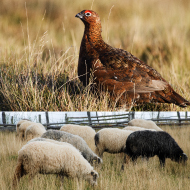Moredun announces novel louping ill project

Louping ill is a serous tick-borne virus of sheep and red grouse.
The Moredun Research Institute and the Game and Wildlife Conservation Trust (GWCT) have joined forces in a bid to combat the growing issue of looping ill, a serious tick-borne virus of sheep and red grouse.
In the 1930s, Moredun developed an effective louping ill vaccine, but it was recently withdrawn from manufacture. The vaccine had been hailed as a game changer for sheep farmers and grouse moor managers alike.
Recently, tick populations have been growing and been expanding their reach into areas where they previously had not been an issue. With this came a rise in tick-borne illnesses and, in the absence of a louping ill vaccine, serious losses in both sheep and red grouse.
“We have had many reports from our hill farming members that they have been losing sheep, mainly ewe hoggs to louping ill, some losing up to 25 per cent of their replacement females which is a serious loss,” explained Dr Beth Wells from the Moredun Research Institute.
“We already have successful partnerships with GWCT and are delighted they have joined us in a new project to work towards a novel vaccine for louping ill control.”
Scientists have identified potential candidates for a new generation louping ill vaccine. These will require further research to ensure they cause an immune response in sheep and protect animals against louping ill.
“This important work will be vital in the fight against LIV, and GWCT is pleased to have been able to help in raising the funds for the Moredun’s work as a separate initiative to our core fundraising activity,” said Dr Adam Smith of the GWCT.
Moredun chair Ian Duncan Miller added: “This research illustrates the benefits of working in partnership and we are very pleased to be working alongside GWCT with this project, which is of extreme importance to both of our industries. This project takes Moredun back to its roots in tackling a really serious disease in the hills and uplands.”
Researchers said the project is due to start later this year and, if successful, will be pushed towards commercialisation ‘as soon a possible’.



 The RCVS has announced a new version of its 1CPD mobile app, with enhanced features for veterinary surgeons and veterinary nurses to record their continuing professional development.
The RCVS has announced a new version of its 1CPD mobile app, with enhanced features for veterinary surgeons and veterinary nurses to record their continuing professional development.